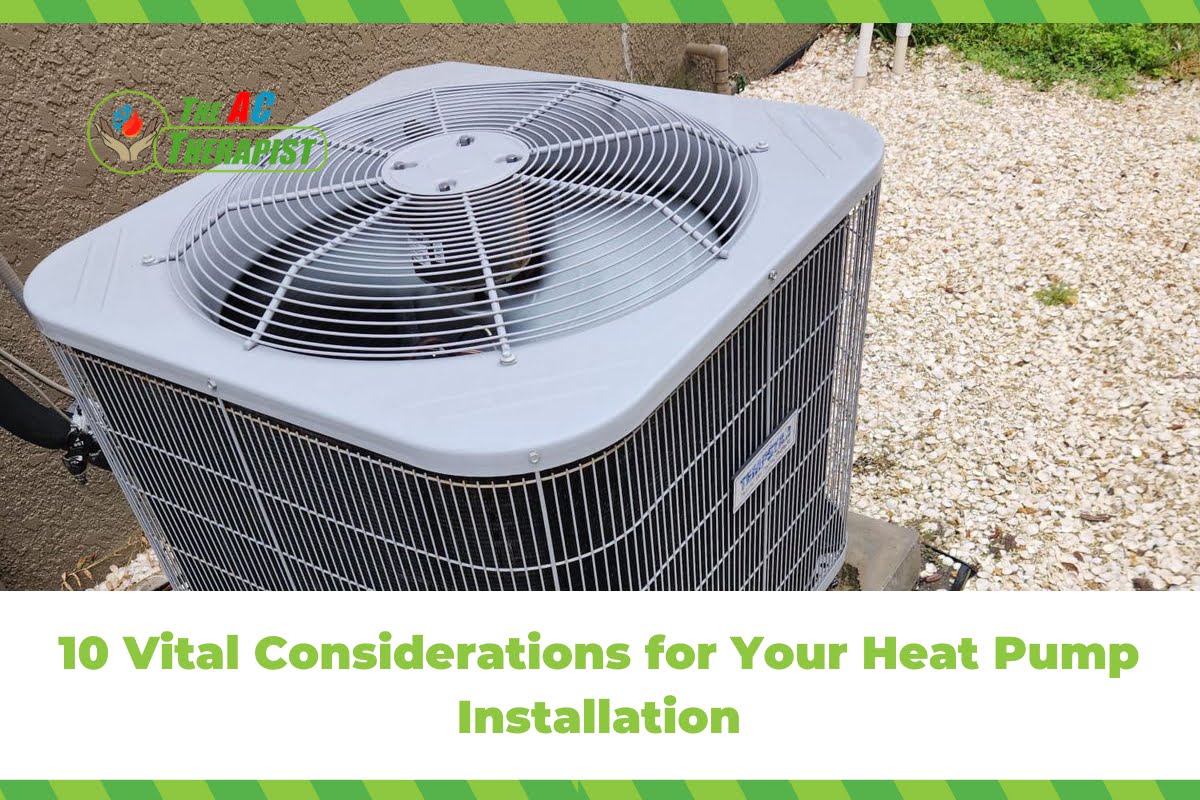10 Vital Considerations for Your Heat Pump Installation
As homeowners look for energy-efficient and cost-effective heating and cooling solutions, heat pumps have emerged as a popular choice. However, before you decide to install a heat pump in your home, there are several important factors to consider. This comprehensive guide will walk you through everything you need to know to make an informed decision about heat pump installation.
How Heat Pumps Work
At their core, heat pumps operate on the principle of heat transfer. Instead of generating heat through combustion or electrical resistance (as traditional furnaces and heaters do), heat pumps move heat from one place to another. This process requires less energy, making heat pumps an energy-efficient alternative to conventional heating and cooling systems.
In heating mode, a heat pump extracts heat from the outside air, ground, or water and transfers it indoors. Despite cold outdoor temperatures, there is still enough thermal energy in the environment for the heat pump to work effectively. In cooling mode, the process is reversed: the heat pump removes heat from the interior of the home and releases it outside, similar to how a standard air conditioner operates.
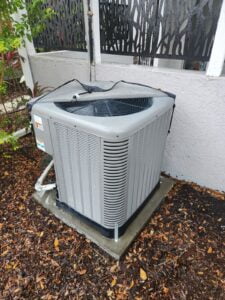
Benefits of Heat Pumps
- Energy Efficiency: Heat pumps are known for their high efficiency, especially in moderate climates. They can provide the same amount of heating or cooling as traditional systems at a fraction of the energy use.
- Cost Savings: Due to their efficiency, heat pumps can lead to significant savings on energy bills over time.
- Environmental Impact: By utilizing electricity and the natural thermal energy available in air, ground, or water, heat pumps have a lower carbon footprint compared to systems that rely on fossil fuels.
- Versatility: The ability to both heat and cool a home with a single system simplifies home climate control and can reduce the need for separate heating and cooling units.
- Improved Indoor Air Quality: Heat pumps circulate and filter air as they operate, reducing dust, mold, and other pollutants in the air.
1. Assessing Your Climate
Assessing your climate is a critical first step before deciding to install a heat pump in your home. The efficiency and effectiveness of a heat pump can vary significantly based on local weather conditions, making it essential to understand how your climate might impact the performance of these systems. Here’s what you need to know about assessing your climate for heat pump installation:
Understanding Heat Pump Efficiency in Different Climates
Heat pumps are most efficient in areas with mild to moderate climates, where the temperature rarely drops below freezing. This is because heat pumps extract heat from the outside air, ground, or water and transfer it indoors. In milder climates, there’s plenty of heat available in the environment, making the heat transfer process more efficient.
Cold Climates
Advancements in heat pump technology have made newer models much more effective in colder climates than older versions. Systems like air-source heat pumps equipped with inverter technology can operate efficiently in temperatures as low as -15°F (-26°C). However, in regions where temperatures frequently fall below this threshold, the efficiency of air-source heat pumps can decrease, potentially necessitating a supplementary heating source to ensure comfort during the coldest days.
Ground-source (geothermal) heat pumps are less affected by air temperature fluctuations and can be a more efficient option in colder climates. This is because the temperature a few feet below the earth’s surface remains relatively constant year-round, providing a consistent heat source for the heat pump.
Hot and Humid Climates
In hot and humid climates, heat pumps are an excellent choice for cooling. They operate similarly to air conditioners but can be more energy-efficient. Additionally, some heat pump models are designed with features to effectively manage humidity, enhancing indoor comfort during hot, muggy months.
Factors to Consider
- Seasonal Energy Efficiency Ratio (SEER) and Heating Seasonal Performance Factor (HSPF): When assessing a heat pump for your climate, look at its SEER rating (for cooling efficiency) and HSPF rating (for heating efficiency). Higher ratings indicate a more efficient unit that can provide energy savings over time, especially important in climates with extreme temperatures.
- Supplementary Heating: In colder climates, consider whether you’ll need a supplementary heating system. Some heat pumps come with built-in electric resistance heaters to provide additional warmth on the coldest days. Alternatively, maintaining an existing furnace as a backup can be a practical solution.
- Professional Assessment: Consulting with a local HVAC professional who understands your climate and can recommend the best type of heat pump for your area is invaluable. They can perform a detailed assessment of your home and suggest a system that will offer optimal efficiency and comfort.
2. Choosing the Right Type of Heat Pump
Choosing the right type of heat pump is crucial for ensuring optimal comfort, efficiency, and cost-effectiveness in your home. Heat pumps come in various forms, each suited to different environments and needs. Understanding the differences between air-source, ground-source (geothermal), and water-source heat pumps can help you make an informed decision that aligns with your climate, property characteristics, and budget. Here’s a closer look at each type to guide your selection process.
Air-Source Heat Pumps (ASHPs)
Air-source heat pumps are the most common type and work by transferring heat between the air inside a home and the air outside. They are particularly suitable for moderate climates but have been increasingly engineered to perform well in colder temperatures too.
Pros:
- Cost-effective installation: Generally, ASHPs are less expensive to install compared to ground-source or water-source systems.
- Energy efficiency: Modern ASHPs are highly efficient, offering significant savings on heating and cooling costs.
- Improved models for cold climates: Advances in technology have led to models that can operate efficiently in temperatures as low as -15°F (-26°C).
Cons:
- Reduced efficiency in extreme cold: While improved, their efficiency can still drop in very cold weather, potentially requiring a supplemental heating source.
- Outdoor noise: The external unit can generate noise, which might be a consideration depending on its location relative to living spaces.
Ground-source (Geothermal) Heat Pumps (GSHPs)
Ground-source heat pumps, also known as geothermal heat pumps, utilize the stable temperature of the ground or groundwater as a source for heating and cooling. They are highly efficient and can be used in a variety of climates.
Pros:
- High efficiency: GSHPs are incredibly efficient all year round, thanks to the consistent ground temperature.
- Longevity and reliability: These systems have a long lifespan, often exceeding 25 years for the indoor components and 50+ years for the ground loop.
- Low operating costs: Despite higher upfront costs, the operational savings can be substantial over time.
Cons:
- High initial investment: The installation of GSHPs is more expensive due to the need to drill or excavate for the ground loop.
- Land requirements: A sufficient amount of land is needed for the ground loop, which may not be feasible for all properties.
Water-Source Heat Pumps
Water-source heat pumps are similar to ground-source systems but use a body of water, such as a lake, pond, or well, as the heat exchange medium. These systems are less common but offer excellent efficiency in suitable locations.
Pros:
- Exceptional efficiency: Like GSHPs, water-source heat pumps offer great efficiency due to the stable temperature of water sources.
- Versatile installation options: They can be a good choice for properties with access to a suitable water source but limited land for a ground loop.
Cons:
- Access to water: Installation is contingent on having a nearby adequate and accessible water source.
- Potential for higher maintenance: Depending on the water quality, there might be a need for more frequent maintenance to manage sediment or biological growth.
Making the Right Choice
When choosing the type of heat pump, consider the following factors:
- Climate: Your local climate will significantly influence the most suitable type of heat pump. For example, air-source heat pumps might be more than adequate in mild climates, while ground-source or water-source pumps could be better in areas with extreme temperatures.
- Property characteristics: The size of your property, land availability, and access to water bodies will play a role in determining the feasible options.
- Budget: Consider both the upfront installation costs and the long-term operating costs. While GSHPs and water-source heat pumps may have higher initial costs, their efficiency can lead to greater savings over time.
- Environmental impact: If reducing your carbon footprint is a priority, the high efficiency of GSHPs and water-source heat pumps might be appealing despite the higher upfront cost.
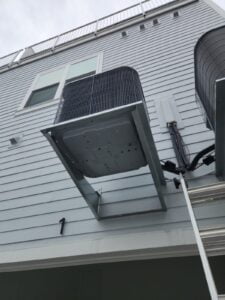
3. Understanding the Costs
Understanding the costs associated with installing a heat pump is a critical component of the decision-making process for homeowners. Heat pumps represent a significant investment, and the total cost can vary widely based on several factors, including the type of heat pump, installation complexity, and potential energy savings. This section will break down the various costs involved in heat pump installation and operation to help you make an informed financial decision.
Initial Investment
The upfront cost of a heat pump system encompasses the price of the unit itself and the installation charges. These costs can vary significantly depending on the type of heat pump you choose:
- Air-Source Heat Pumps (ASHPs): Generally, ASHPs are the most affordable option, with costs varying depending on the brand, model, and capacity. Installation for these systems can range from a few thousand dollars to over $10,000 for high-end models designed for colder climates.
- Ground-Source Heat Pumps (GSHPs): Also known as geothermal heat pumps, GSHPs have a higher initial cost due to the need for ground loop installation. Total installation costs, including the system and ground loop, can range from $10,000 to $30,000 or more, depending on the property size, soil conditions, and system size.
- Water-Source Heat Pumps: The costs for these systems are similar to GSHPs, as they also require a water source and the installation of a water loop system. The total cost can vary based on access to the water source and the complexity of the installation.
Operating Costs
One of the main advantages of heat pumps is their energy efficiency, which translates into lower operating costs compared to traditional heating and cooling systems. The exact savings will depend on your local climate, the efficiency of the unit, electricity rates, and how well your home is insulated. In general, heat pumps can reduce energy use by 30% to 60%, leading to significant savings on utility bills over time.
Maintenance Costs
Heat pumps require regular maintenance to operate efficiently. This includes annual inspections by a professional, as well as routine tasks that homeowners can perform, such as changing or cleaning filters. The cost of professional maintenance services can vary, but budgeting for an annual check-up is a good practice. While maintenance costs add to the overall expense of owning a heat pump, they are generally comparable to or less than the maintenance costs for conventional HVAC systems.
Potential Rebates and Incentives
To encourage the adoption of energy-efficient heating and cooling solutions, many governments and utility companies offer rebates and incentives for heat pump installations. These can significantly offset the initial investment. Incentives may include tax credits, rebates on the purchase price, and reduced rates for electricity used by the heat pump. It’s important to research and apply for any available incentives in your area, as they can make a substantial difference in the overall cost.
Long-Term Savings
When considering the cost of a heat pump, it’s essential to take into account the long-term savings on energy bills. Although the upfront cost may be higher than traditional heating and cooling systems, the reduced operating costs can result in significant savings over the lifespan of the unit, which can be 15 years or more for ASHPs and up to 25 years for GSHPs.
4. Evaluating Your Home’s Insulation and Ductwork
Before installing a heat pump, it’s crucial to assess your home’s insulation and ductwork. Proper insulation will significantly improve the efficiency of your heat pump, reducing energy consumption and costs. If your home has existing ductwork, it should be inspected to ensure it’s in good condition and compatible with your new system. In some cases, ductless mini-split heat pumps might be a more suitable option.
5. Considering the Size and Capacity
Considering the size and capacity is a pivotal aspect of the heat pump installation process. Ensuring that your heat pump installation involves a unit that is correctly sized for your home is crucial for achieving optimal efficiency, comfort, and longevity of the system. An improperly sized heat pump can lead to a myriad of issues, including inefficient operation, increased wear and tear, and higher energy costs. This section will delve into why size and capacity are so important in the context of heat pump installation and how to ensure you get it right.
The Importance of Correct Sizing in Heat Pump Installation
When planning a heat pump installation, it’s essential to understand that one size does not fit all. A heat pump that’s too small for your home won’t be able to adequately heat or cool the space, leading to constant operation and excessive strain on the unit. This not only increases your energy bills but can also shorten the lifespan of the heat pump.
Conversely, a heat pump that’s too large for your needs will cycle on and off too frequently, a process known as short cycling. This inefficiency results in wasted energy and can cause uneven temperatures throughout your home. Moreover, frequent cycling puts additional stress on the heat pump, potentially leading to more frequent repairs and a reduced lifespan.
Calculating the Right Size for Your Heat Pump Installation
The process of determining the correct size for your heat pump installation involves several factors beyond just the square footage of your home. A professional HVAC contractor will perform a detailed load calculation, which takes into account:
- Insulation levels: Good insulation reduces the amount of heating and cooling needed, impacting the size of the heat pump required.
- Window types and orientations: Windows can significantly affect how much heat is gained or lost, influencing the heating and cooling load.
- Home layout and design: Open spaces may require different heating and cooling considerations compared to a home with many small rooms.
- Local climate: The average temperatures and humidity levels in your area will affect the capacity needed for effective heating and cooling.
- Occupancy and lifestyle: The number of people living in your home and your typical thermostat settings also play a role in determining the right size for your heat pump installation.
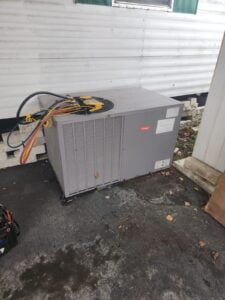
6. The Importance of Professional Installation
The importance of professional installation cannot be overstated when it comes to heat pump installation. A successful heat pump installation requires not just the selection of the right unit but also the expertise that only a professional can provide. This ensures that the heat pump installation process is carried out efficiently, safely, and in compliance with all relevant standards and regulations. Let’s delve into why professional installation is so crucial for your heat pump installation.
Ensuring Correct Heat Pump Installation
One of the primary reasons to insist on professional installation for your heat pump installation is the assurance of correct setup. Heat pump installation involves intricate electrical work, precise refrigerant handling, and a thorough understanding of the system’s mechanics. Professionals bring the necessary skills and experience to the heat pump installation, ensuring that the unit operates as intended, providing optimal efficiency and performance.
Maximizing Efficiency Through Professional Heat Pump Installation
The efficiency of your heat pump installation is directly tied to how well the unit is installed. A professional heat pump installation ensures that the system is set up to operate at its peak efficiency. This includes proper sizing, as discussed earlier, and correct ductwork configuration, airflow, and refrigerant charge. These factors are critical for the heat pump installation to deliver the expected energy savings and comfort levels.
Avoiding Common Pitfalls in Heat Pump Installation
Professional heat pump installation helps avoid common pitfalls that can occur with DIY or inexperienced installations. These can include improper handling of refrigerant, incorrect wiring, or inadequate sealing of ductwork. Such mistakes can lead to reduced performance, higher operating costs, and even safety hazards. By choosing professional heat pump installation, homeowners can sidestep these issues, ensuring a smooth and effective setup.
Complying with Regulations and Warranties
Heat pump installation is subject to various local building codes, regulations, and manufacturer warranty requirements. Professional installers are familiar with these regulations and ensure that your heat pump installation complies with all necessary standards. This not only ensures legal compliance but also protects the validity of your heat pump’s warranty. Many manufacturers require professional heat pump installation as a condition of their warranty, making it essential to choose a qualified installer.
Access to Expert Advice
Beyond the technical aspects of heat pump installation, professionals can provide valuable advice on maintaining your system, optimizing its use, and troubleshooting any issues that may arise. This expertise is an invaluable part of the heat pump installation process, offering homeowners peace of mind and support throughout the lifespan of their heat pump.
7. Maintenance and Upkeep
Regular maintenance is key to keeping your heat pump running efficiently and extending its lifespan. This includes cleaning or replacing filters, checking the system’s components, and scheduling professional maintenance checks. Many HVAC contractors offer maintenance plans that can provide peace of mind and help prevent unexpected repairs.
8. Rebates and Incentives
To encourage energy efficiency, many governments and utility companies offer rebates and incentives for installing heat pumps. These can significantly reduce the upfront cost of installation. Research available options in your area or consult with your HVAC contractor to take advantage of these savings.
9. Noise Considerations
Modern heat pumps are designed to operate quietly, but some noise is inevitable, especially for outdoor units. Consider the placement of the outdoor unit to minimize noise impact on your living spaces and comply with any local noise regulations.
10. Long-term Benefits
While the upfront cost and installation process can seem daunting, the long-term benefits of installing a heat pump are significant. These include lower energy bills, reduced carbon footprint, and improved indoor air quality and comfort. With the right preparation and professional guidance, a heat pump can be a valuable investment in your home’s future.
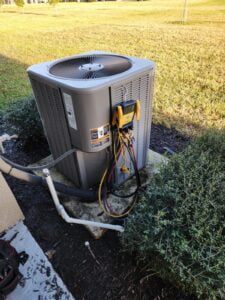
Unlocking Comfort and Efficiency
As The AC Therapist, I’ve walked countless homeowners through the journey of upgrading their homes with heat pumps, ensuring they enjoy enhanced comfort and efficiency. Reflecting on these experiences, I shared my top 10 insights to guide you through the critical considerations before embarking on your heat pump installation. From understanding your climate to recognizing the importance of professional installation, each point is designed to empower you with knowledge and confidence.
Heat pump technology offers a remarkable opportunity to not only improve your home’s heating and cooling efficiency but also to contribute to a healthier environment by reducing carbon emissions. However, the key to unlocking these benefits lies in careful planning and informed decision-making. By considering the size and capacity, evaluating your home’s insulation and ductwork, and understanding the costs involved, you can ensure that your heat pump installation is a resounding success.
Remember, as your dedicated AC Therapist, I’m here to help you navigate these decisions, offering expert advice and professional services tailored to your unique needs. Together, we can create a comfortable, efficient, and sustainable living environment for you and your family. So, let’s embark on this journey with confidence, knowing that a well-informed heat pump installation is a step toward a more comfortable and energy-efficient future.

